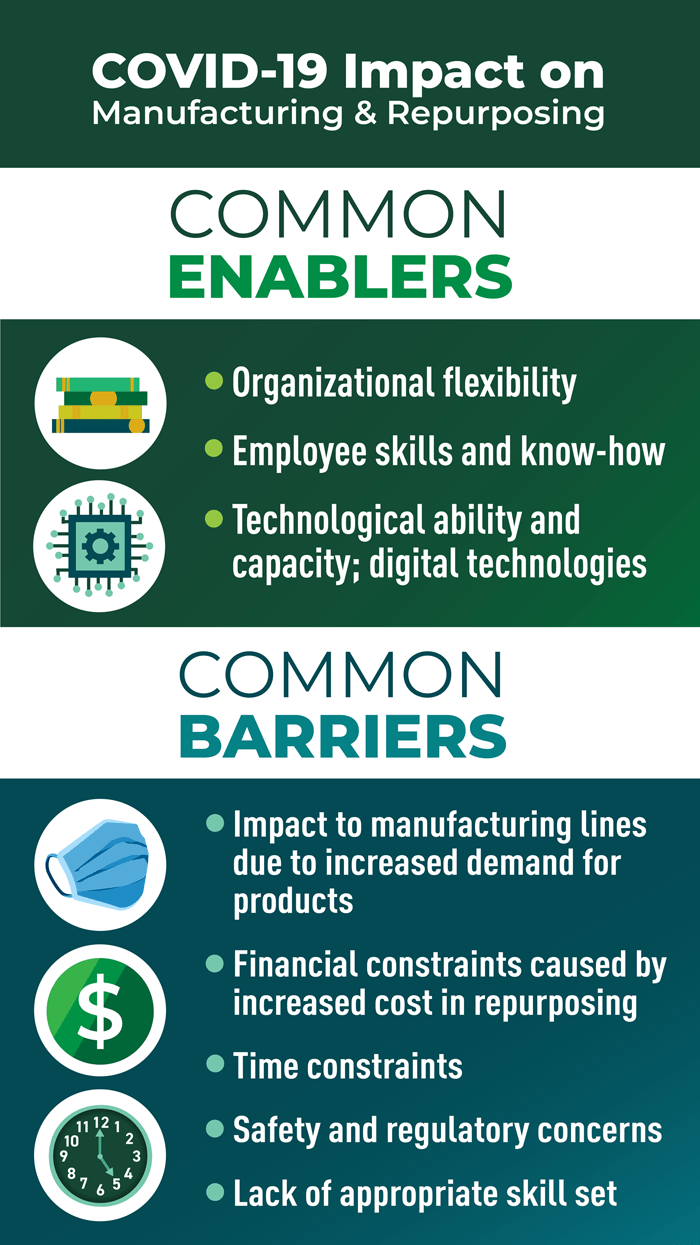Jindal School Researchers Examine COVID-19 Impact on Manufacturing
By: Brittany Magelssen | Sept. 23, 2020

Researchers at The University of Texas at Dallas have examined how manufacturers are — or aren’t — pivoting successfully in response to major manufacturing disruptions as a consequence of the COVID-19 pandemic.
In a study published July 27 in IEEE Engineering Management Review, two faculty members from the Naveen Jindal School of Management found that manufacturing response to the disruption has been largely reactive and uncoordinated, and many firms’ crisis communication plans do not include managing an infectious-disease outbreak.
The researchers identified the supporting enablers and competing barriers of manufacturing repurposing within the context of disruption caused by COVID-19. The article offers practitioners and policymakers best practices for pivoting successfully.
“The research was an eye-opener in terms of understanding the challenges for manufacturers in dealing with such an abrupt, massive disruption,” said Dr. Ramesh Subramoniam, clinical associate professor of operations management and one of the paper’s co-authors.
“The COVID-19 pandemic brought everything to a standstill. Even before that, supply chain disruption frequency had increased in recent years. Establishing a resilient framework to meet such supply chain disruptions is the immediate need for practitioners,” he said.

“The research was an eye-opener in terms of understanding the challenges for manufacturers in dealing with such an abrupt, massive disruption.”
Dr. Ramesh Subramoniam, clinical associate professor of operations management
Because of the extensive scope of disruption distributed across countries and industries, pandemics are different from typical disruptions, which are generally focused on specific industries or products, Subramoniam said.
According to the International Labour Organization, approximately 47 million employers, representing some 54% of all employers worldwide, operate businesses in the sectors hardest hit by COVID-19: manufacturing, accommodation and food services, wholesale and retail trade, and real estate, business and administrative activities.
Manufacturing is expected to be one of the most severely affected sectors in terms of the negative economic impact, said Dr. David Widdifield, a co-author of the paper, clinical associate professor of operations management and director of the Master of Science in Supply Chain Management program.
Comets Care
Comets are stepping up to make an impact in the fight against COVID-19. Read their stories on the University Outreach webpage.
“A sudden disruption, such as the pandemic, opened up questions on the critical need for companies to reevaluate their existing supply chain risk mitigation strategies — this includes the sectors of manufacturing responsible for the mass production of personal protection equipment (PPE) for health care workers,” said Widdifield, who also serves as assistant dean of graduate programs in the Jindal School.
The researchers surveyed employees of manufacturing firms. Completed between June and July 2020, the study assessed online responses from 71 manufacturing practitioners across 39 facilities and six continents.
Some companies supplied critical equipment and devices needed by the public and health care workers, oftentimes exploring new technologies.

“The research shows a lack of capability among some manufacturers to deal with the increased demand for new products, such as medical devices, while other manufacturers have the ability to pivot to a new normal.”
Dr. David Widdifield, clinical associate professor of operations management
Others found “repurposing and pivoting” — the process of manufacturers rapidly switching to a new product or process — more challenging. Manufacturing repurposing includes adapting production plans, lines and capabilities to meet new demand goals.
“The research shows a lack of capability among some manufacturers to deal with the increased demand for new products, such as medical devices, while other manufacturers have the ability to pivot to a new normal,” Widdifield said. “The study also brings forward the impact of digital technologies such as 3D printing, artificial intelligence and machine learning, and how they prime organizations to respond faster and be more resilient to such rapid disruptions in the future.”
The study found:
- Almost all the organizations (94%) were operational during the peak of the pandemic. Of those, 56% were at full operations capacity, and 44% were at partial capacity.
- Multiple manufacturing firms repurposed during the pandemic. Target products included respirators and their components, medical PPE and hand sanitizers.
- Repurposing was less likely and did not occur for several product families, including mobile X-rays, surgical gloves, screening test kits and other diagnostic equipment.
- Despite the increasing number of disruptions caused by epidemics, natural disasters and other large-scale regional and global events, many firms’ crisis communication plans do not specifically include managing an infectious-disease outbreak.
The research also has implications for consumers, Subramoniam said. Companies were tested on how well they took care of their employees during the pandemic.
“The average consumer should look at how companies responded to the pandemic in treating them, their friends and relatives,” he said. “These are very strong indications of an organizational culture and capability. Future employees want to work for such companies with a strong culture of product and process innovation and growth, with the employees as the core asset.”
Co-authors of the paper included Dr. Okechukwu S. Okorie and Dr. Fiona Charnley of the Un
iversity of Exeter in England, and John Patsavellas and Dr. Konstantinos Salonitis of Cranfield University in England.
Media Contact: Brittany Magelssen, UT Dallas, 972-883-4357, brittany.hoover@utdallas.edu, or the Office of Media Relations, UT Dallas, (972) 883-2155, newscenter@utdallas.edu.






